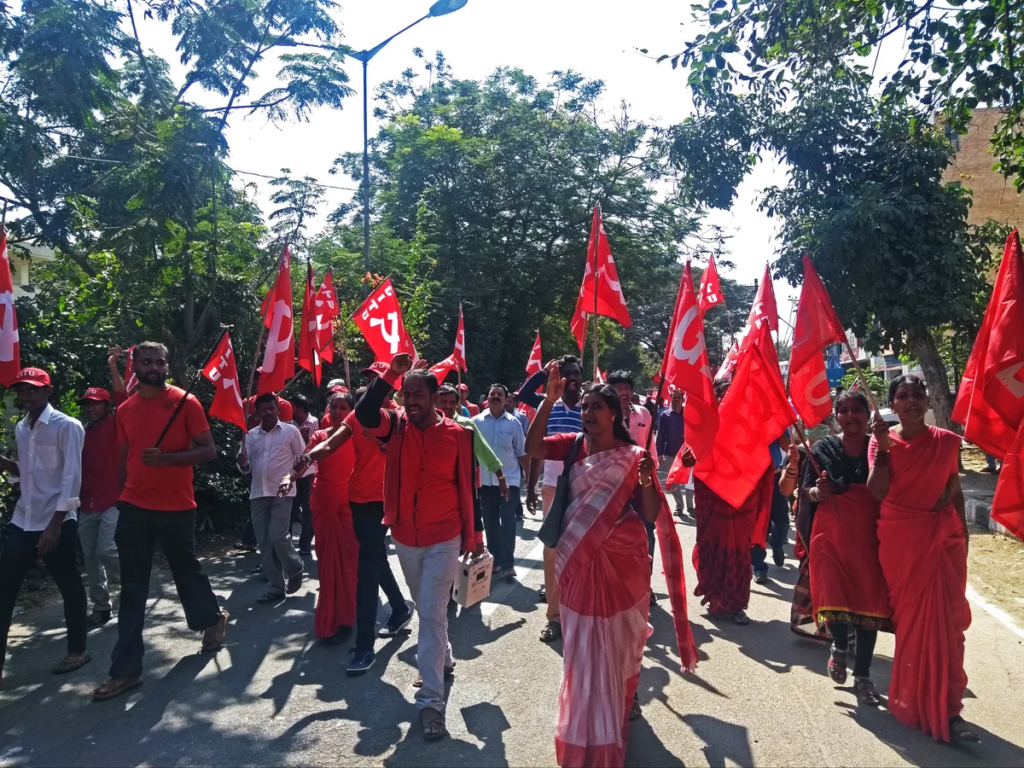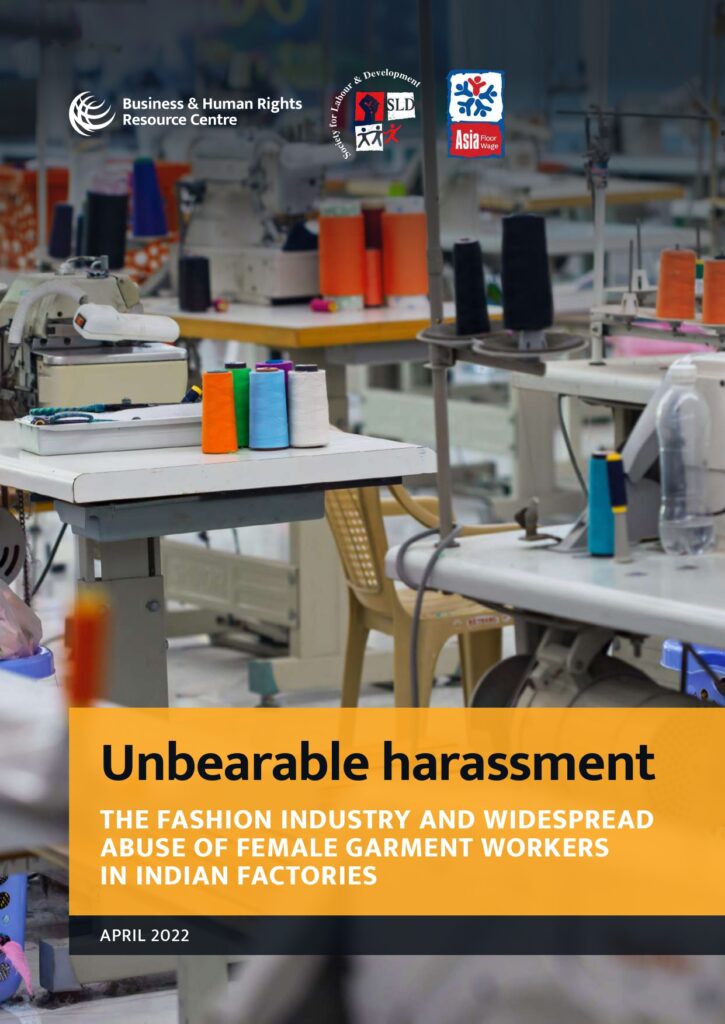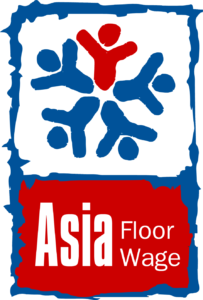New Report: Fashion Brands’ Pandemic Response Heightened Risk of Gender-Based Violence in India’s Garment Industry
India (April 22, 2022) – First-hand testimony from women workers informs new report on gender-based violence & harassment in India’s apparel factories
“Verbal, physical, and sexual harassment exists in every garment factory – not just this one. It existed before COVID, it exists during COVID, and it will exist after COVID.”
– Smita*, garment worker in Tamil Nadu factory which produces clothes for ASDA, C&A, Carrefour, JD Sports and Tesco

Garment worker abuse in India’s factories intensified due to fashion brands’ response to the COVID-19 pandemic, according to a new report from the Business & Human Rights Resource Centre (BHRRC), Asia Floor Wage Alliance (AFWA) and Society for Labour and Development (SLD). The report, titled, Unbearable Harassment: The Fashion Industry and Widespread Abuse of Female Garment Workers in Indian Factories, cites testimonies from 90 women in 31 factories across three major garment-producing hubs in India: Delhi NCR, Karnataka and Tamil Nadu. These factories supply, or have recently supplied, to at least 12 global fashion brands and retailers: American Eagle, ASDA, C&A, Carrefour, H&M, JD Sports, Kohl’s, Levi Strauss & Co., Marks & Spencer, Primark, Tesco and VF Corporation (and its portfolio brands, including Vans). The research found all women garment workers had witnessed or experienced gender-based violence and harassment (GBVH) in their workplaces.
Smita*, who worked at a factory in Tamil Nadu producing for ASDA, C&A, Carrefour, JD Sports and Tesco, said: “Verbal harassment is a feature of this job – as production targets increase, the harassment increases. Every day is stressful – supervisors call you ‘bitch,’ ‘moron,’ ‘idiot’ if you do not make your targets. We should learn to ignore it, but sometimes we are not able to and start to cry. Harassment is less in units that produce for domestic markets, but the pay is also lower.”
While garment workers reported GBVH on a daily basis before the pandemic, their experiences of GBVH at work intensified with successive COVID-19 waves, including reports of discrimination and unfair dismissal for pregnancy, lack of protection from COVID-19 and intensified work rates with inhumane and mandatory overtime, leading to exhaustion and increased accidents.
Shantha*, who worked at a factory in Karnataka producing for Marks & Spencer and other global brands said: “There are more accidents in the factory after the COVID-19 lockdown. There is at least one accident every day, and the rise in production targets is the main reason. We are always in a hurry to meet targets. We end up cutting our fingers or piercing them with needles.”
Alysha Khambay, Head of Labour Rights, Business & Human Rights Resource Centre, said: “The fashion industry’s unsustainable and irresponsible business model has created and sustained conditions for systemic and widespread abuse of female garment workers. It is shocking that every one of the 90 women we spoke with reported directly experiencing or witnessing gender-based violence and harassment in their factories. When brands routinely request discounts, demand unrealistically short lead times, make last-minute changes to orders and aggressively squeeze suppliers on price, they contribute to a culture of abuse with consequences for workers and their families which extend beyond the factory floor. Suppliers manage these unreasonable demands from the fashion brands by exploiting vulnerable garment workers, the majority of whom are women, and engaging in abusive practices which lower production costs. India’s gendered culture of impunity also sets the stage for sexual harassment and violence to thrive within garment factories.”
“The COVID-19 pandemic only exacerbated this abuse as suppliers faced increasingly unstable relationships with fashion brands which cancelled orders, delayed payments and squeezed suppliers even further to protect profits – all without any consideration for the workers whose daily lives they were affecting. The fashion industry’s prioritisation of short-term profit, combined with inadequate government regulation and damaging patriarchal norms, has brought us to this point. It’s time for brands to be held legally accountable for the treatment of women workers who make their clothes and profits, and take urgent action to tackle GBVH in their supplier factories.”
Meena*, who worked at a garment factory in Tamil Nadu which produced clothes for C&A, Carrefour and Tesco, said: “When we [returned to work] … our targets were very high – 1,200-1,300 units a day. Lunch was cut and unpaid overtime was increased by 30-45 minutes per day. Threats of termination were frequent, and workers who made even small mistakes were threatened aggressively. Verbal harassment and physical harassment, including hitting and throwing bundles of clothes at women workers were more common during this period.”

One of the brands named in the report, H&M, along with its supplier factory in India, Eastman Exports, has recently signed a binding agreement with unions and labour groups – namely Tamil Nadu Textile and Common Labour Union (TTCU), Asia Floor Wage Alliance (AFWA) and Global Labor Justice-International Labor Rights Forum (GLJ-ILRF) – becoming the first brand to sign an agreement to tackle GBVH in Asia’s garment industry.
Nandita Shivakumar, Campaigns and Communications Coordinator, Asia Floor Wage Alliance, said: “Brands must uphold their responsibilities under international human rights law to protect women workers from GBVH and other forms of exploitation by negotiating legally binding, enforceable agreements between brands, suppliers and trade unions that cover GBVH and freedom of association in the operations of their supplier factories. A good example of this model is the legally binding Dindigul Agreement that H&M and its supplier Eastman Exports recently signed with the factory’s union, Tamil Nadu Textile and Common Labour Union (TTCU) and other labour stakeholders, which addresses discrimination and violence based on gender, caste, and migration status; increases transparency, and helps address the power imbalances on the garment factory floor.”
*Names have been changed to protect the women’s identities.
####
About us:
Business & Human Rights Resource Centre is an international NGO that tracks the human rights impacts of companies across the globe. For more, contact: Priyanka Mogul (London), Media Officer, Business & Human Rights Resource Centre, mogul@business-humanrights.org
Asia Floor Wage Alliance (AFWA) is an Asian labour-led global labour and social alliance across garment-producing countries (such as India, Indonesia, Sri Lanka, Cambodia, Bangladesh, Pakistan) and consumer regions (USA and Europe) for addressing poverty-level wages, gender-based violence, and freedom of association in global garment production networks. For more, contact: Nandita Shivakumar (India), Campaigns and Communications Coordinator, Asia Floor Wage Alliance, nandita.s@asia.floorwage.org
